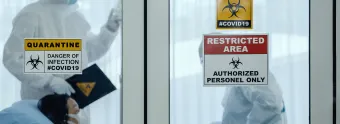How does COVID-19 relate to biological weapons?

How does COVID-19 relate to biological weapons?
In addition to COVID-19, the coronavirus pandemic has seen the spread of disinformation and conspiracy theories regarding the intentional nature of the virus, allegedly manipulated in a laboratory similar to a biological weapon. Reliable scientific evidence has refuted such assertions. However, the fact remains that, whatever the origin of the outbreak, whether natural, accidental or deliberate, by state or non-state actors, societies need to be better prepared to prevent, mitigate or face the effects of epidemics and pandemics.
This is a topic that has been under discussion for several years among the States Parties of the 1972 Biological Weapons Convention (BWC), particularly during the so-called inter-sessional meetings of States Parties or Meetings of Experts between the BWC Review Conferences. Such meetings offer an opportunity for government officials, responsible for the implementation of the BWC, to consider collaborations with representatives of the World Health Organization (WHO), the biotechnology industry, the scientific community, academia and civil society organisations.
During this time, the GCSP has been working with the United Nations Office for Disarmament Affairs (UNODA) and, in particular, the Implementation Support Unit (ISU) of the BWC to allow informal debates on these topics in preparation for official meetings, share knowledge and good practices among all stakeholders. Since in-person meetings are currently impossible due to the coronavirus crisis, GCSP joined the ISU on 13 May 2020 in co-hosting a webinar on the topic: “The COVID 19 Pandemic: Preliminary Lessons for Assistance, Response and Preparedness under the BWC”.
The panellists were: Dr Cedric Invernizzi (Spiez Laboratory, Switzerland), Prof. Xiao-Ping Dong (Director of the Center for Global Public Health, China CDC), Kazuhiro Nakai (Deputy Permanent Representative of Japan to the Conference on Disarmament), Dr Jaime Yassif, Senior Fellow at NTI, and Ambassador Amandeep Singh Gill (Project Director, International Digital Health & AI Research Collaborative, Geneva). Some 200 participants took part in the webinar.
The presentations and the following discussion addressed national and multilateral responses to the COVID-19 crisis and potential implications for the provisions of the BWC regarding international cooperation and assistance. Indeed, Article VII of the BWC states: “Each State Party to this Convention undertakes to provide or support assistance, in accordance with the United Nations Charter, to any Party to the Convention which so requests, if the Security Council decides that such Party has been exposed to danger as a result of violation of the Convention.” In other words, there is a legal obligation for all States Parties to assist any other State Party that would suffer from a biological attack. Fortunately, this provision has never had to be applied since entry into force of the Convention in 1975 because there was no evidence or allegation of any biological weapon use. However, the process of seeking assistance, including emergency aid pending a decision of the UN Security Council, has been the object of discussions and table-top exercises, and lessons learned in this context may offer a relevant applicability in case of a natural or accidental outbreak.
This insufficiency was starkly revealed by the current pandemic. One conclusion of the debates over the need for improved preparedness is that, once societies enjoy universal healthcare, well-equipped hospitals, easily accessible testing and protection gear, timely vaccination and treatment, well-implemented isolation measures, as well as adequately enforced laws and regulations (required by UN Security Council resolution 1540 of 2004), any deliberate use of pathogens would become less attractive to perpetrators because it would have less impact. Another aspect raised was the funding of such preparedness: until recently, the private sector preferred to invest in research of drugs for non-communicable diseases, considered more profitable, leaving it to the public sector to fund research, treatment and vaccines for infectious diseases. Also, the huge discrepancy between healthcare funding and the production, procurement and trade in weapons was mentioned as an issue that has been made highly visible by the pandemic, and one that will need to be addressed. Indeed, less than one day of global military spending ($1.9 trillion) could fund WHO’s entire budget.
Find out more about the topic of Arms Proliferation at the GCSP.
Disclaimer: The views, information and opinions expressed in the written publications are the authors’ own and do not necessarily reflect those shared by the Geneva Centre for Security Policy or its employees. The GCSP is not responsible for and may not always verify the accuracy of the information contained in the written publications submitted by a writer.
Marc Finaud is a former French diplomat who was seconded to the GCSP from 2004 to 2013 and is now a staff member. At the GCSP, Mr Finaud was leading activities related to Arms Proliferation.

